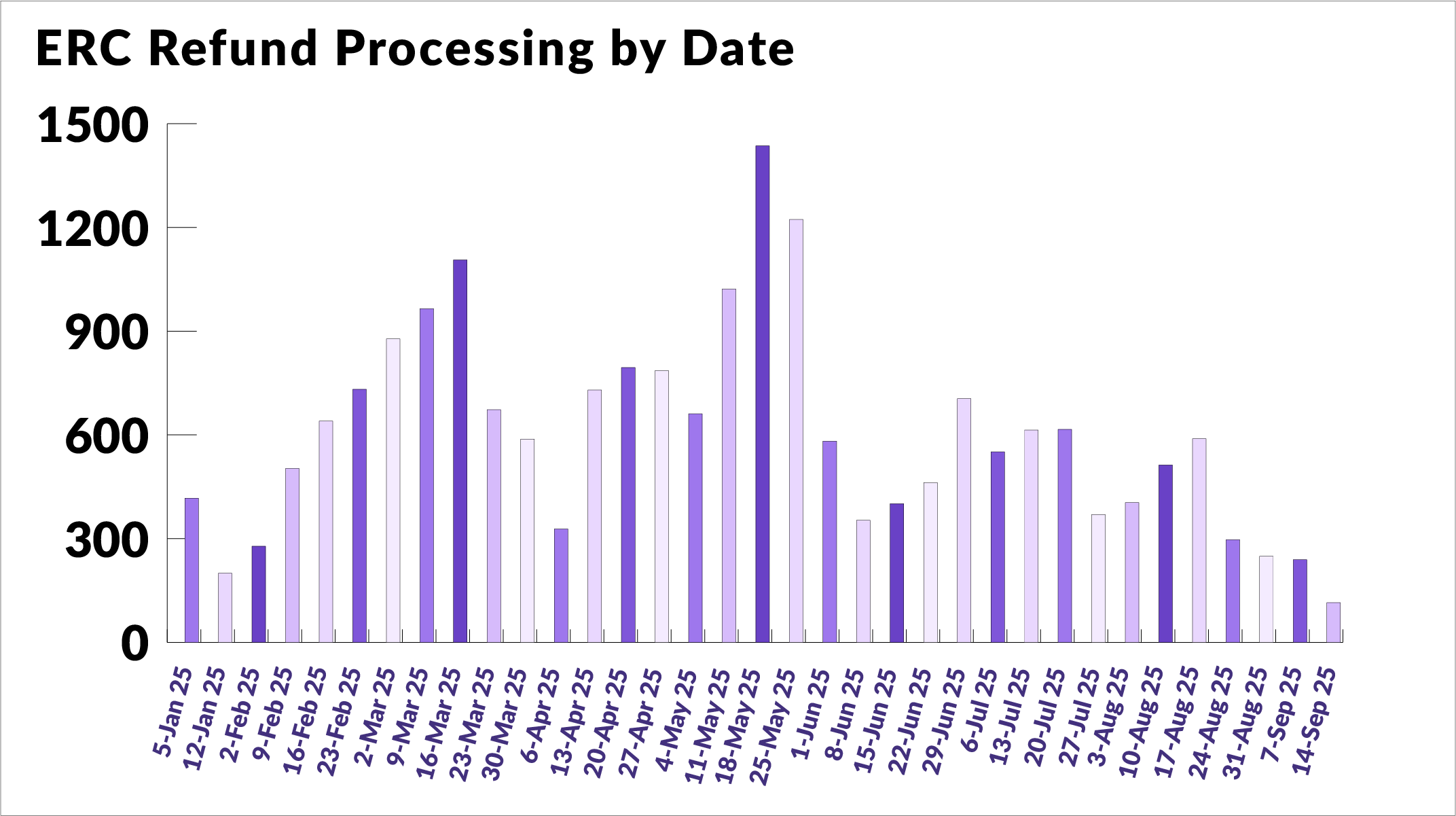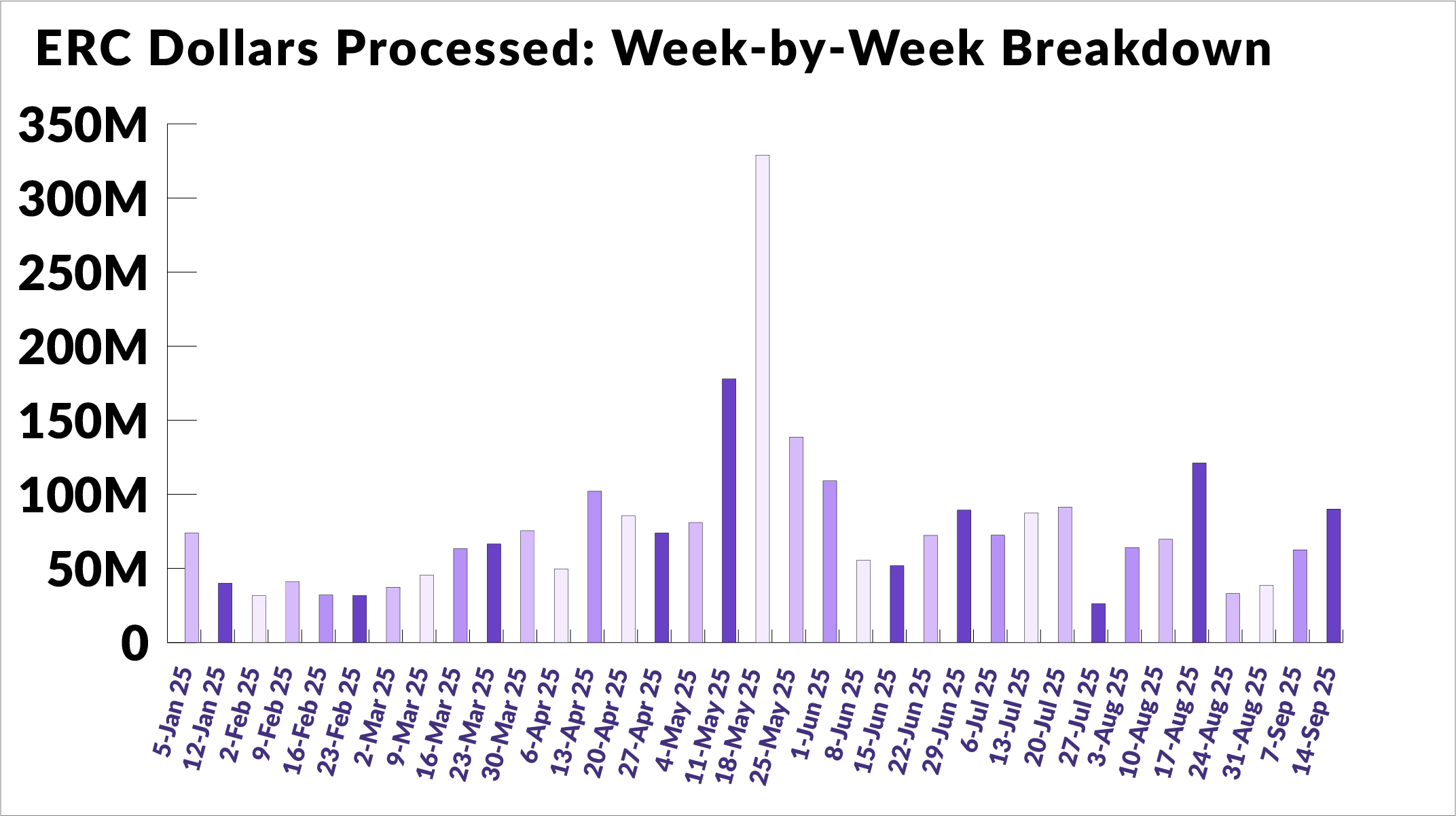
After a long holiday weekend, businesses and tax professionals returned to their offices with empty inboxes and that sinking feeling that ERC processing has become an afterthought for the IRS. This past week marked the lowest number of refunds processed since December 2024. With four months left in the year, it’s becoming clear that the IRS’s pledge to close out ERC processing by year-end is yet another empty promise.
Unfortunately, the bad news doesn’t stop there. ERC denial levels reached a new high for 2025, with many 105C letters riddled with errors and inaccuracies. On the brighter side, audits cooled off toward the end of the month, and the average refund size climbed to an all-time high, though largely skewed by a single multi–seven figure refund.
Adding to the uncertainty, a potential government shutdown looms if Congress fails to pass IRS funding legislation by September 30th.
📉 Total refunds plummeted to just 115, a 50%+ drop from last week’s 238, setting a new low for 2025.
📈 Average refund amount spiked to $783,360, up from last week’s $262,204, though heavily skewed by one TaxNow client refund in excess of $50 million. This stat is heavily influenced by “outlier” checks and should be taken with caution when evaluating overall trends.
📈 Total dollar volume surged to $90.1M, up from last week’s $62.6M, with more than half tied to a single quarterly refund.
📉 Average days from filing to refund jumped back up to 475, compared to 314 the prior week, suggesting fewer 2025-filed claims were processed relative to 2024 and prior. With that said, several of the refunds released were for 2025 filings, including a few in the seven figures.


1. New IRS Shutdown Looms - Congress returned from recess facing a September 30th deadline to fund the government, with the IRS budget at the center of the standoff. House Republicans want to cut $2.8 billion from the agency and block funding for its free filing tool, while Democrats argue that additional reductions after months of layoffs and leadership turmoil would undermine taxpayer services and enforcement. The recent departures of IRS Commissioner Billy Long and Treasury Deputy Secretary Michael Faulkender only add to the uncertainty. Even a short-term stopgap would complicate IRS preparations for tax season, but a full shutdown could be especially damaging, further delaying backlogged ERC claims and slowing much-needed refunds for businesses.
2. IRS Releases New Guidance for R&D Credits - On August 28, 2025, the IRS released Revenue Procedure 2025‑28, clarifying how small businesses, those with average gross receipts under approximately $31 million, can retroactively elect to fully deduct domestic R&D expenses under Section 174A back to tax years beginning after December 31st, 2021. This guidance allows taxpayers to amend their 2022 and 2023 returns and, in many cases, claim unlimited immediate deductions without filing a new amended 2024 return. The change significantly reduces administrative hurdles, while still protecting anti‑shelter compliance. However, with the IRS’s historically long processing times for amended returns, now often exceeding 12 months, businesses may face extended delays in securing refunds. A proactive approach to managing these filings can make a world of difference, and tools that track the status of IRS amendments and refunds, like TaxNow, can bring much-needed clarity and confidence amid the backlog.
Kenny's Conclusions
The past week’s data paints a mixed picture: refunds have slowed to their lowest levels of the year, denials are climbing, and processing times are stretching even further, all while a potential government shutdown threatens to make matters worse. Although audit activity showed a welcome decline in August, the continued surge in 105C letters underscores the IRS’s aggressive stance on ERC claims. For businesses still waiting on refunds, the months ahead may prove increasingly uncertain, with timing and outcomes hinging not just on IRS capacity, but also on the broader political fight over agency funding.
Signing off!
Kenny Dettman, CPA
Disclaimer: *𝘋𝘢𝘵𝘢 𝘴𝘦𝘵 𝘪𝘴 𝘧𝘳𝘰𝘮 𝘢𝘱𝘱𝘳𝘰𝘹𝘪𝘮𝘢𝘵𝘦𝘭𝘺 14,000 𝘣𝘶𝘴𝘪𝘯𝘦𝘴𝘴𝘦𝘴 𝘵𝘳𝘢𝘤𝘬𝘪𝘯𝘨 𝘌𝘙𝘊*